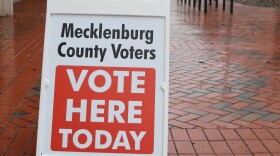Republicans in the GOP-dominated state legislature have taken a big step towards achieving long sought-after changes to North Carolina's voting rules. And the sweeping changes would be put in place just in time for next year's presidential election.
In a Wednesday night vote, the state Senate signed off on modifications made to a measure by House lawmakers. The legislation covers everything from mail-in ballot rules to the conduct of partisan poll observers — but one thing it doesn’t do is provide any money for elections administration.
"It doesn't appropriate money for boards of elections for more workers to handle the increased load of provisional ballots, the major changes to same-day voter registration, and to create the lists and reports of the voter rolls and ballots as required under this bill," lamented Rep. Zack Hawkins, D-Durham, arguing against the GOP bill during House floor debate on Wednesday evening.
The North Carolina General Assembly's Fiscal Research Division puts the bill's price tag at around $6 million over the next two years. That figure includes money needed for voter education, precinct worker training, and upgrading the state's election information management system that is used for processing everything from mail-in ballots to maintaining registration records and voter rolls.
"We do need to talk to our appropriations folks," said House Elections Committee Chairman Grey Mills, acknowledging the need for such funds. But Mills said funding needs to be addressed in budget discussions.
Major changes loom for mail-in ballots, poll observer conduct
Among the major changes the bill would trigger is the elimination of a three-day grace period for accepting and counting mail-in ballots postmarked by Election Day.
As pointed out by Rep. Joe John, D-Wake, the grace period was established in 2009, unanimously approved by lawmakers on both sides.
"To my knowledge, it's operated pretty much without issue year by year for 14 years since," John said on the House floor. "So I guess my basic position is: 'If it ain't broke, don't fix it.'"
And John pointed out that while 30 other states — red and blue — have Election Day deadlines for mail-in ballots, conservative states like Mississippi and Kansas have grace periods. Like fellow Democrats and voting rights advocates, John expressed a fear that unreliable mail postal service could result in otherwise valid votes getting tossed out.
"My primary concern is that cancellation of the three-day grace period potentially, seriously penalizes with the loss of their sacred vote, disenfranchises those well-intentioned voters who conscientiously and responsibly follow the rules and do everything required of them by placing their ballot in the mail ahead of time," John said.
But Rep. Grey Mills, the House Elections Committee chairman, dismissed such concerns.
"North Carolina voters are smart voters, they're conscientious voters, they will know the rules ahead of time, let's make Election Day mean Election Day," he said during floor debate on Wednesday.
The proposed changes notwithstanding, state law requires a nine-day, post-Election Day grace period for counting absentee-by-mail ballots from military personnel and other citizens overseas.
And Election Day results are never final and certified until 10 days later, following the statutorily required canvass. That audit includes hand-to-eye counts of randomly selected precincts in each county, the validation of provisional ballots, and the reconciliation of votes cast and tabulated.
Lingering anger from 2020 fuels GOP push for change

Republicans have been clear that part of the motivation for eliminating the grace period is their continuing anger over a temporary rule change for the 2020 elections amid the COVID-19 pandemic.
Voting rights advocates had sued the state elections board to extend the grace period for mail-in ballots and to ease rules around the absentee-by-mail witness requirement. The State Board of Elections and State Attorney General Josh Stein, a Democrat and now 2024 gubernatorial candidate, settled the lawsuit.
The settlement resulted in a six-day extension of the grace period for 2020 only.
The Republican bill also spells out guidelines for partisan poll observers. Party chairs may appoint precinct-specific and at-large observers to monitor polling sites with candidates from those parties on the ballot. In 2024 that could mean precincts with multiple observers from five recognized parties: the GOP, Democratic, Green, Libertarian, and the No Labels parties.
Under the bill, observers would be permitted to listen to conversations between a voter and precinct official as long as the discussion is related to elections administration.
Jim Womack, president of the North Carolina Election Integrity Team, said he is pleased that lawmakers are attempting to codify poll observer conduct, although he wishes they had gone farther.
"Really what we're after is just trying to put objective standards on what poll observers are allowed to do and what they're not allowed to do," Womack said in a telephone interview with WUNC.
NCEIT is a branch of the Election Integrity Network, an organization established by Cleta Mitchell. Mitchell is the North Carolina-based attorney known for assisting Donald Trump in his effort to get Georgia Secretary of State Brad Raffensperger to "find" nearly 12,000 votes that could reverse the legitimate outcome of the 2020 presidential race.
Womack and Mitchell consulted with GOP lawmakers as they worked on the latest elections legislation.
Democrats, voting rights advocates worry new poll observer rules will lead to voter intimidation
"This is an invitation to remake the role of poll observers into partisan operatives who are intent on intimidating voters and causing trouble," said Sen. Natasha Marcus, D-Mecklenburg, referring to the proposed guidelines for poll observers during debate in the state Senate on Wednesday.
After the 2022 primaries, the State Board of Elections surveyed county elections directors about issues at polling sites. Officials in 15 counties reported problems ranging from voter intimidation to entering restricted areas where ballot data were uploaded.
This week's debate elicited a particularly impassioned response from House Democratic Leader Robert Reives, who expressed his worry that changes to rules for mail-in balloting and poll observers could impede a person's right to vote.
"If they're working two jobs, we just made it harder for them," Reives said. "If they're just not comfortable with somebody staring them down when they're trying to cast their vote, we just made it harder for them."
Reives is Black and invoked his predecessors' struggles in the civil rights movement during his statements on the House floor. He and other critics have pointed out that Republicans are pushing for these sweeping changes amid baseless claims of widespread voter fraud.
"And I can't think but one reason why and that we've decided that some people just shouldn't have the right to engage in the franchise, and I hope that's nobody's motivation, but doggone if that isn't the result," Reives concluded.
The bill is on its way to Democratic Governor Roy Cooper's desk, and then a probable veto, and a likely override by the GOP's veto-proof legislative majority.











